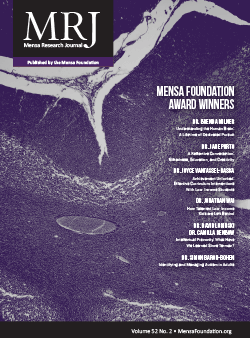Revisiting the Work of Mensa Foundation Award Winners
- Jun 24, 2021
- Marie Mayer, Interim MRJ Editor

The Mensa Foundation is celebrating its 50th anniversary this year. While I was in the process of doing research to write about its origins, I realized how many prestigious researchers the Foundation has recognized with awards over the years. Many had earned multiple Awards for Excellence in Research recognitions — as a junior researcher and then a senior researcher — before they received a Lifetime Achievement Award.
Being curious, I wondered what these researchers were doing now. What I found was fascinating and plentiful — and this issue contains but a sampling, with a nod to the past and a look to the future.
Leading off the issue is an interview with Lifetime Achievement Award winner Dr. Brenda Milner, a British-Canadian who has been referred to as “the founder of neuropsychology.” Her contributions revolutionized the understanding of how brain structures govern different learning, memory, and speech functions. At the age of 102, she is still active in research.
Second up is an interview with Dr. Jane Piirto, whose varied career includes teaching and writing — scholarly and literary. An award-winning scholar in education and psychology, she has authored books, articles, studies, poems, and an award-winning novel. She is known for the Piirto Pyramid of Talent Development, which is described in the article.
Dr. Joyce VanTassel-Baska has been recognized for her vast contributions to the field of education, particularly gifted education and talent development. In “Achievement Unlocked: Effective Curriculum Interventions With Low-Income Students” she explores curriculum intervention for gifted students from low-income and culturally diverse backgrounds.
One area of research for Dr. Jonathan Wai, winner of multiple Awards for Excellence in Research, has been the narrowing of achievement gaps for talented but disadvantaged students. In “How Talented Low-Income Kids Are Left Behind,” we learn how identifying gifted students early in their education can put them on track to greater success, to the benefit of society.
The inaugural Lifetime Achievement Award went to Dr. Julian Stanley in 2000, then a professor of psychology at Johns Hopkins University, where he began an early and influential study of gifted children. An advocate of accelerated education for academically gifted children, he founded the Johns Hopkins University Center for Talented Youth (CTY). In 1971 he began a related research project, the Study of Mathematically Precocious Youth (SMPY), to model the longitudinal study by Dr. Lewis M. Terman.
While studying at Johns Hopkins, Dr. Camille Benbow became a protégé of Dr. Stanley, and took on SMPY when he retired. When she moved to Iowa State University, she directed the study there from 1986 to 1998. Dr. David Lubinski accepted a position at Iowa State and began working with her on the project. In 1998 they both joined the faculty at Vanderbilt University, where they now co-direct SMPY, a 50-year longitudinal study of five cohorts consisting of more than 5,000 intellectually talented individuals. “Intellectual Precocity: What Have We Learned Since Terman?” provides some insights. This article has also just been awarded a 2021 Award for Excellence in Research.
Professor Sir Simon Baron-Cohen is a British clinical psychologist and professor of developmental psychopathology known for his leading autism research and theories. “Identifying and Managing Autism in Adults” comes to us from Prescriber, a leading UK peer-reviewed journal for health care professionals.
* * *
When I took on editing the MRJ, I meant for that to be a temporary role, hence the title “Interim Editor.” Two years later, I’m ready to pass on the role to a new editor because I believe in the importance of providing opportunities to people who can bring different perspectives, fresh energy, and innovative ideas to a job. So, this is my last issue as Interim Editor. Jeff Papa is the name you’ll see on the masthead of your next issue. I’m looking forward to seeing his talents at work.
Stepping down is bittersweet because I have enjoyed this adventure. However, I have several projects that have been waiting for my attention since I allegedly “retired” from my day job more than 10 years ago. Thank you for reading. You are what makes this volunteer gig worthwhile.
* * *
Published three times yearly, the Mensa Research Journal highlights scholarly articles and recent research related to intelligence from a diverse selection of nationally and internationally esteemed authors. Learn more about the MRJ and subscribe today.
Featured Research & Interviews
- “Understanding the Human Brain: A Lifetime of Dedicated Pursuit Interview with Dr. Brenda Milner,” by Chenjie Xia (McGill Journal of Medicine, Vol. 9, No. 2)
- “A Reflective Conversation with Jane Piirto,” by Shyanne Sansom, Bryan Barnes, Jason Carrizales, and Michael F. Shaughnessy (Gifted Education International, Vol. 34, Issue 1)
- “Achievement Unlocked: Effective Curriculum Interventions With Low-Income Students,” by Joyce VanTassel-Baska (Gifted Child Quarterly, Vol. 62, Issue 1)
- “How Talented Low-Income Kids Are Left Behind,” by Jonathan Wai and Frank C. Worrell (Phi Delta Kappan, Vol. 102, Issue 4)
- “Intellectual Precocity: What Have We Learned Since Terman?,” by David Lubinski and Camilla P. Benbow (Gifted Child Quarterly, Vol. 65, Issue 1)
- “Identifying and Managing Autism in Adults,” by Elizabeth Weir, Carrie Allison, and Simon Baron-Cohen (Prescriber, Vol. 31, Issue 2)